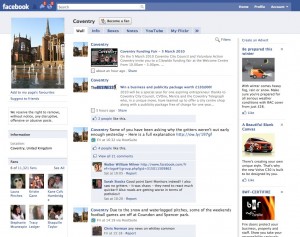 There’s been a lot of talk recently about Facebook and their privacy issues, as well as their perceived attempts to ‘take over the web’ through their ‘like’ buttons and other integrations with their platform.
There’s been a lot of talk recently about Facebook and their privacy issues, as well as their perceived attempts to ‘take over the web’ through their ‘like’ buttons and other integrations with their platform.
As a result, quite a few commentators and influential social media types have announced that they are leaving Facebook, deleting their accounts and removing all the content – which isn’t that easy to do, it turns out.
I’m in no position to criticise what other people do, so I’m not going to – but I’m not going to leave Facebook. I’m not saying the privacy and other stuff isn’t important – it is. The Facebook privacy settings are a usability nightmare, but I do encourage everyone to take a look at theirs and lock them down however tightly you want. Below are my reasons why I’m not quitting:
1. It’s where an awful lot of people are
Facebook is where I connect online with less geeky family and friends. As some of you may have heard, my dad’s on Facebook. He isn’t on Twitter, or any of the other less-known platforms. Likewise with a lot of my friends for whom the internet isn’t the be-all and end-all of their lives (yes, such people do exist). If I stopped using Facebook, I’d stop seeing what these people are up to, their photos and other stuff. For me, that’s a bad thing.
2. My life is already all over the internet
Even if I wanted to, I can’t turn back now. I dread to think what information about me is already online, even taking Facebook out of the equation. If I decided to leave Facebook for that reason, then surely I would then, logically, have to track down all that information that is in other places. I simply cannot summon up the energy to do this. I made a decision a few years back that I was going to use the web to build a career and live my life. I can’t now complain that people I don’t know can find stuff out about me.
3. Attempts to control the internet always fail
Look what happened to AOL. If Facebook really thinks it can control the content people see and the way they see it on the web, they’re mad, and they’ll end up becoming irrelevant. I don’t really care that Facebook are trying to spread their platform wherever they like: let them. If it ends up being a case of giving up too much control for benefit accrued, people won’t engage with it and it will die.
4. My job means I need to use and understand Facebook
This is the killer for me, to be honest. A lot of the customers I work with want to use Facebook – it’s where people are, after all. How can I effectively advise them if I don’t know how the latest Facebook technology works, because I’m not using it myself? FIne I can read about stuff in blogs and whatnot, but nothing replaces the learning you get from playing with things yourself. So, professionally, I have to stay engaged with what remains one of the biggest and most influential social computing sites in the world.
Are you quitting Facebook, or sticking with it? I would be interested in hearing other people’s views!
Possibly related posts:
]]>John Naughton is spot on about the recent Facebook announcements in his Observer column:
What’s comical about this stuff is not so much its implicit arrogance – the assumption that we all want to share using Facebook – as its historical naivety. The history of the web is littered with the whitened bones of enterprises that once dreamed of total control. So until the cure for megalomania is invented, the only known antidote is a mantra. Repeat after me: the net is bigger than any single enterprise. And nobody owns it.
Well worth reading in full.
Possibly related posts:
]]>Is: if everyone hates you, don’t try and be their friend.
(Click for bigger, or see the full car crash in realtime.)
Possibly related posts:
]]>One of the highlights of last Wednesday’s LGComms event was hearing about Coventry City Council’s Facebook page.
If you click to see the larger image, you’ll notice that the page has 11,321 fans (as at the time of writing).
11,321!
Remarkable stuff. As I wrote, quite a while ago now, it’s tricky to use Facebook when you are the sort of organisation nobody loves to love. Who wants to be a fan of their local authority? No-one I know.
How did Ally Hook and colleagues manage this feat? Pretty simple. It’s not the Council’s FB page…it’s the city’s. Tapping into civic pride is a great way of getting people to engage. Using your Facebook page to provide up to date information on weather related issues during snowpocalypse probably helps too.
In other words:
- be relevant: don’t try and get people to want to join a weird club for the council, tap into what people want to belong to
- be useful: use the space in a way that actually benefits people, rather than as just another comms channel
Facebook will continue to be incredibly useful for those wishing to engage with citizens. It’s where the people are, and the numbers keep growing. Just because it has been around for a while shouldn’t mean us social media geeks look down on it. Is it time you took another look at Facebook?
Possibly related posts:
]]>Formspring seems a neat little service.

It creates a profile for you on which people can ask questions, either anonymously or by logging in.
Questions don’t become publicly published though until you decide they are worth answering, so there is the possibility for a bit of quality control there.
Also what’s neat is that you can integrate it with a few different social networking sites, like Twitter and Facebook, so you can ensure people in those spaces get to see your answers.
What’s more, you can grab some embed code so people can submit questions to you from any website or blog.
I can see a potential use for this simple technology for politicians to answer questions in public from citizens. Am sure there are plenty of others too – any ideas?
Here’s my profile. Feel free to try out asking a question on it. I might answer, if you aren’t too rude ![]()
Possibly related posts:
]]>Is Facebook really the best place to advertise this product?

Maybe it is…
Possibly related posts:
]]>
I had an interesting time at Socitm09 – a lot of the conversations I had were useful, and others fruitful. I won’t lie to you, though, a lot of what I saw and heard I found pretty painful. My Twitter followers will no doubt know the exact point at which my frustration boiled over somewhat.
One of the highlights for me, though, was the twenty minutes Mary and I spent with Adrian Hancock, MD of Socitm, and a forward thinking chap if ever there was one. His plans for the organisation are certainly going to lead it in the right direction.
We’ve already put one of the things we talked about into action, and that’s OpenSocitm. This is a simple Ning based online community for Socitm members and non-members to talk about the organisation and what they would like to get out of it. At Learning Pool, we understand community and its importance, and we’re eager to share that with other organisations that would like to work with us.
We hope it will become a space for the more forward thinking among Socitm’s ranks to get together and contribute to the ongoing discussions about what Socitm should look like in the future.
Because Socitm, like any other membership organisations, faces massive challenges in this age of self-organising and free and simple social networks. Put simply: why should I pay a subscription to Socitm when I can create a Facebook group and talk to people that way?
This is picking up on the pioneering work started by David Wilcox with the RSA (I’m a fellow of the RSA and was involved in David’s work here), which has developed in various directions, some official, some less so, based around the OpenRSA concept. Basically: identify the enthusiastic, the innovative and the people with ideas and put them in a space together – and watch and act on what happens.
My view – which David shares, I’m sure – is that for membership bodies to remain relevant in the networked society, they must learn to start listening to their membership like never before. Develop services around the explicit needs as expressed by members in social online spaces. Accept messiness. Acknowledge the fact that membership might mean different things to different people, and that just because someone doesn’t hold a card, it doesn’t mean they have nothing valuable to contribute.
I’ve no doubt that Adrian gets this, and that OpenSocitm will provide a useful channel of ideas and suggestions for the future of Socitm for him and his colleagues to act upon. He’s already started blogging about it.
Possibly related posts:
]]>The Knowledge Hub is a terrifically ambitious project being run by IDeA, in partnership with CLG, to bring knowledge and information sharing to the local government sector. A mixture of technology and capacity building, the aim is to alter the culture of local government, to change the way people in councils think about how success is measured, and how innovations and improvement can be rolled out across the entire sector.
Learning Pool are keen to play as big a role in this process as possible: after all, we have the background in local government, we have collaboration in our bone marrow, and we also have a pretty good idea about what works, technology-wise. So when the opportunity came up to bid for a project to develop a prototype which will inform the development of the Knowledge Hub, we pulled out all the stops to make sure we got it.
And get it we did (subject to the usual cooling off periods and boring contract stuff, of course).
The Partnerships and Places Library is an online resource of case studies from local authorities and local partnerships. It’s chock-full of useful content, but isn’t terribly interactive and probably isn’t the most engaging collection of content on the web.
Learning Pool will produce for the IDeA a fully interactive community, where content sharing, conversation and use of rich media will be encouraged and supported. Our concept for the site was called WorkTogether in recognition of the collaborative, silo-busting nature of the project.
We’re also keen to get the detail right on this project, and support open information and data sharing where we can. The new site will produce RSS a-plenty and will integrate with services like Calais to produce really useful semantic metadata. Everything will be built on open source technology, and where bespoke development is needed, that too will be released to the community.
Updates on development will be posted on the Learning Pool blog. We’re on a pretty tight schedule, so you all should be able to see some results before too long. If anyone is keen to be in on the user testing, leave us a comment here and we’ll do our best to involve you.
We’re delighted, because we see this as the first step in an exciting journey for Learning Pool. We’re going to be delivering a really innovative online project, and will be a part of the wider Knowledge Hub process. But this is also the start for us becoming local government’s trusted advisor and partner when it comes to developing social media, web 2.0 – or whatever you like to call it – strategies and products.
If your council is considering taking its first tentative steps into this new media world, get in touch with us – drop me a line on 07525 209589 or email me on [email protected]. I’d love to come and talk to you about this stuff, and see where Learning Pool can help.
Update: if you want to keep an eye on this project’s development on Twitter, follow @worktogetheruk!
Cross posted from the Learning Pool blog.
Possibly related posts:
]]>
As a user of Google’s enterprise tools, usually known as Google Apps, Socialwok looks very interesting.
It sticks a social networking layer on top of your email, calendar, Docs and so on – something that the Google suite was really missing if being used as the main infrastructure for an organisation.
Here is a video to explain more:
Possibly related posts:
]]>There was all sorts of excitement yesterday with the news that yet another Council has reacted to the fact that some of their staff spend some of their time using social networks.
This from Arun on LocalGov.co.uk:
Staff at Portsmouth City Council have been banned from using social networking sites after a local paper investigation revealed they spent up to 572 hours a month on Facebook.
The Freedom of Information (FoI) request from Portsmouth paper, The News, discovered that on average the council’s 4,500 staff spent 413 hours on Facebook per month.
Usage peaked in July when 572 hours – equivalent to 71 working days – were spent on the site.
Following the investigation council chief executive David Williams issued a council-wide ban on all social networking sites.
‘We intend to restrict Internet access to social networking sites more than at present for non-business use,’ he said.
‘Any member of staff may, under this revised policy, make a business case to have these sites unblocked.
Sigh. It must have been a slow news day, as even the BBC reported on it – and of course they phoned up those level headed folk at Taxpayers’ Alliance for a quote. Double sigh.
The approach taken by the Council in this instance is similar to action taken by other local authorities in response to the growth in the use of social networking sites across local government. Such responses are needlessly risk-averse, and threaten these organisations’ ability to use online technology to innovate.
Putting aside the fact that, on an individual basis, the time spent on social networking sites was negligible anyway, the mistake that these councils are making is to treat online interaction differently from any other form of behaviour.
Were a member of staff found to be spending working time reading a newspaper at their desk, for example, would newspapers be banned from council offices? I doubt it.
When members of staff are found to be spending lots of time sending personal emails, is the facility removed from everyone who works there? Nope.
The same could be said of chat amongst staff, whether around the water cooler, or at desks. No organisation in their right minds would attempt to enforce a ban on talking in the office.
If a member of staff is wasting time on the internet, whether on social networks or any other site, then they should of course be disciplined, but using the same code of conduct that another other time wasting incident would employ. There is nothing new about this, except for jumping on a new piece of technology and inventing new rules for it – just because it is different.
This is a management issue, and requires a management response, not a technological one. There are no sensible reasons for blocking these websites, it is a simple case of organisations both not trusting their staff to manage their time effectively and not trusting managers to manage properly.
And I haven’t even mentioned how using social networks in the workplace can actually a) increase productivity; b) be used to do interesting engagement stuff with citizens; c) make an organisation seem like the sort of place a normal person might want to work, rather than some weird, cut-off, luddite backwater.
Sharon has written a good account of this on her blog, and Shel has picked it up in the States.











